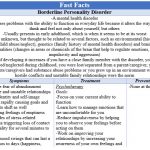Why are you afraid of being alone?
Despite your intense fear about being alone, you often get angry and have outbursts that cause others to leave. This results in you having many unstable relationships. If this sounds like your life, you might have borderline personality disorder. What is this? Can it be treated?
 Definition
Definition
Borderline personality disorder is a mental health condition. It causes problems with your ability to function in everyday life because it alters the way you think and feel not only about yourself, but others. Often, it presents in early adulthood, which is when the symptoms seem to be at their worst. The cause of borderline personality disorder isn’t known, but thought to be related to several factors, such as environmental (history of child abuse/neglect), genetics (family history of mental health disorders) and brain abnormalities (changes in areas or chemicals of the brain that help to regulate emotions, mood, impulsivity and aggression). This is why your risk of developing it increases if you have a close family member with the disorder, you were abused/neglected during childhood, you were lost/separated from a parent/caregiver, your parents/caregivers had substance abuse problems or you grew up in an environment where hostile conflicts and unstable family relationships were the norm.
Symptoms of borderline personality disorder can vary person to person. Most people feel an intense fear of abandonment, so they do everything that they can to avoid any form of rejection/separation whether it’s real or imagined. These individuals often have passionate and unstable relationships where they worship their partner in one moment and then feel that the other person doesn’t care in the next. The person’s self-identity and self-image changes rapidly causing their goals and values to shift as well. This results in them seeing themselves as a bad person and to have ongoing feelings of emptiness. Many times, these individuals have episodes of stress-related paranoia triggering them to lose contact with reality for anywhere from several minutes to hours. They also have wide mood swings that can last a few hours to days and can include severe happiness, irritability, shame or anxiety. Sometimes, they have periods of strong, inappropriate anger where they’re viewed as being sarcastic/bitter or engage in physical violence. These individuals are more likely to engage in activities that are impulsive and risky, like gambling, reckless driving, spending sprees, drug abuse, unsafe sex or sabotaging their success (ex. ending a positive relationship or quitting a good job). Some people fear separation/rejection so much that they feel suicidal.
Due to the wide variety of symptoms, complications also vary greatly. Typically, it results in negative impacts on intimate relationships, jobs, school, social activities and self-image. This causes repeated job changes/losses, not finishing your education, multiple legal issues, conflict-filled relationships, involvement in abusive relationships, unplanned pregnancies, greater risk of developing a sexually transmitted infection, increase in motor vehicle accidents/physical fights, self-injury or attempted suicide. It’s important to note that those with borderline personality disorder often have other mental health disorders, such as depression, anxiety disorders, eating disorders, bipolar disorder, other personality disorders, post-traumatic stress disorder (PTSD), attention deficit/hyperactivity disorder (ADHD) and alcohol/substance abuse.
Treatment
There are many different treatment options for borderline personality disorder, but before we take a closer look at them, it’s important to note that if you’re feeling suicidal, seek help immediately. There are several ways to do this. Call 911 or your local emergency number. Call a suicide hotline, such as the National Suicide Prevention Lifeline at 1-800-273-TALK (8255). This is a 24-hour number, so help is always available. If you’re a veteran, call the number and press “1” to get to the Veterans Crisis Line. You can also reach out to loved one, close friend, trusted peer/co-worker, your mental health provider/doctor or someone within your faith community. By reaching out, you’ll get the help you need to be safe from self-injury and assistance in getting the care you need.
Once making sure that your life isn’t immediate danger, the next step of treatment involves psychotherapy. The goals are to focus on your current ability to function, learn how to manage emotions that are uncomfortable for you, reduce impulsiveness by helping you to observe your feelings before acting on them and work on improving your relationships by increasing your awareness of your own feelings and those around you. There are many types of psychotherapy and your doctor will help you decide which will work best for you. Dialectical behavior therapy (DBT) takes a skills-based approach to help you learn how to manage your emotions, tolerate distress and improve relationships and it can be done in individual or group therapy. Schema-focused therapy is designed to help you identify your unmet needs that are contributing to your negative life patterns and to help you find a healthier way to get your needs met. Mentalization-based therapy (MBT) encourages you to realize your own thoughts and feelings at any given moment and to think before you react. Systems training for emotional predictability and problem-solving (STEPPS) is a treatment that involves working in groups and incorporates your family and friends over a 20-week period. This is often used in conjunction with other types of therapy. Transference-focused psychotherapy (TFP) is designed to help you understand your emotions and interpersonal challenges through the developing relationship between you and your therapist and then apply these to various situations in your life.
Sometimes, you might need to take medication to help you while you’re going through therapy. There aren’t any specific medications designed to treat borderline personality disorder, but instead the medications are used to treat symptoms or other concurrent problems. This means you might need to take antidepressants, antipsychotics or mood-stabilizing medications. It’s essential to know that the process of learning how to manage your emotions, thoughts and behaviors takes time, so don’t give up. There are things that you can do to help manage your condition. The first is to learn as much as possible about borderline personality disorder. Next, it’s helpful to learn what your triggers are that result in an angry outburst or impulsive behavior. Using coping skills, such as breathing techniques and meditation, can help. Don’t assume that you know what other people are thinking/feeling and set limits for yourself and others. It’s essential to not blame yourself for having the disorder, but it is your responsibility to get treatment and to stick with it. Also, make sure you get treatment for any other disorders. Having a support system of people who can understand and respect you is very beneficial.
Prevention
There isn’t anything that you can do to prevent borderline personality disorder from occurring. The key is to recognize symptoms and to seek help early. This will help to limit the disruption the disorder can cause in your life.
Borderline personality disorder can be a challenging disease to live with, but by getting help, you’ll be able to have a healthier life. If you have any question or concerns about borderline personality disorder, please speak with your doctor. If you would like more information, please visit the National Alliance of Mental Illness’ (NAMI) Borderline Personality Disorder page at https://www.nami.org/learn-more/mental-health-conditions/borderline-personality-disorder